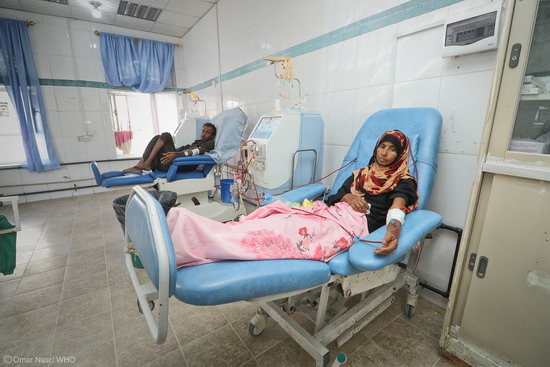 3 March 2020 – After 5 years of taking care of patients, Radeah found herself on the other side of the fence, suffering from renal failure. Since her diagnosis three years ago, she has had to quit her work as a nurse. She now comes to hospital not to treat patients, but rather receive treatment for her illness—with dialysis sessions twice weekly.
3 March 2020 – After 5 years of taking care of patients, Radeah found herself on the other side of the fence, suffering from renal failure. Since her diagnosis three years ago, she has had to quit her work as a nurse. She now comes to hospital not to treat patients, but rather receive treatment for her illness—with dialysis sessions twice weekly.
“I have lost 3 of my friends to renal failure and I don’t want to be next, this is why I am grateful for these sessions. When I was diagnosed with this disease, I knew that I could lose my life. I am always afraid that the dialysis equipment would stop working during my session, because if that ever happened, they would have to insert a catheter from my neck, which is very dangerous and painful,” Radeeah says.
The burden of renal failure is agonizing, with the loom of death hovering over patients experiencing renal failure. “I don’t think anyone knows what it is like to suffer from this. You lose everything. Your body cannot cope, so you lose your job. The pain is so severe that you get depressed, feeling hopeless. When I found out that I had renal failure, it felt like my life was taken from me, these sessions have given me hope,” says Tamer.
Tamer is a 37-year-old pharmacist who used to work days and nights for many private companies, but when he was diagnosed with renal failure, he had to stop working — his body become so frail, he could no long function normally.
The process of going through dialysis treatment requires a lifestyle overhaul for most patients. Their lives now revolve around dialysis sessions they need twice weekly — without which they could die.
Three years ago, Hassan also lost his livelihood after being diagnosed with renal failure. “Before the illness, I was running my own business. I had to stop because of my weekly dialysis sessions that always leave me feeling weak. And although I feel weak, at least I am still alive,” says Hassan.
Since losing his business, Hassan has had to take his 7 children to Raimah, to stay with relatives. The cost of supporting them in the capacity city of Sana’a was too much. “Although it is difficult for me to live in Sana’a alone, especially with my condition, this is the cruelty of my current situation. I rely on donations from family and friends to sustain us and I count on these dialysis sessions to keep me alive”.
Thousands of renal failure patients in Yemen could face a fatal fate, if dialysis treatment is not secured. Their survival depends on unfettered access to uninterrupted treatment.
“I am grateful that these sessions are free of charge. I couldn’t afford them otherwise,” concluded Tamer.
In 2019, WHO, with support from King Salman Humanitarian and Relief Center (KSRelief), United Arab Emirates Aid, and Kuwait, managed to provide dialysis supplies to support 21 dialysis centres by 600 000 dialysis sessions in 13 governorates (Amanat Al Asimah, Aden, Taiz, Sana'a, Sa’adah, Ma’rib, Shabowa, Hadramout, Dhamar, Al Bidha, Ibb, Hudaydah, and Al Mahrah) to cover the urgent need of more than 3500 patients requiring life-saving dialysis sessions to ensure continued treatment.


